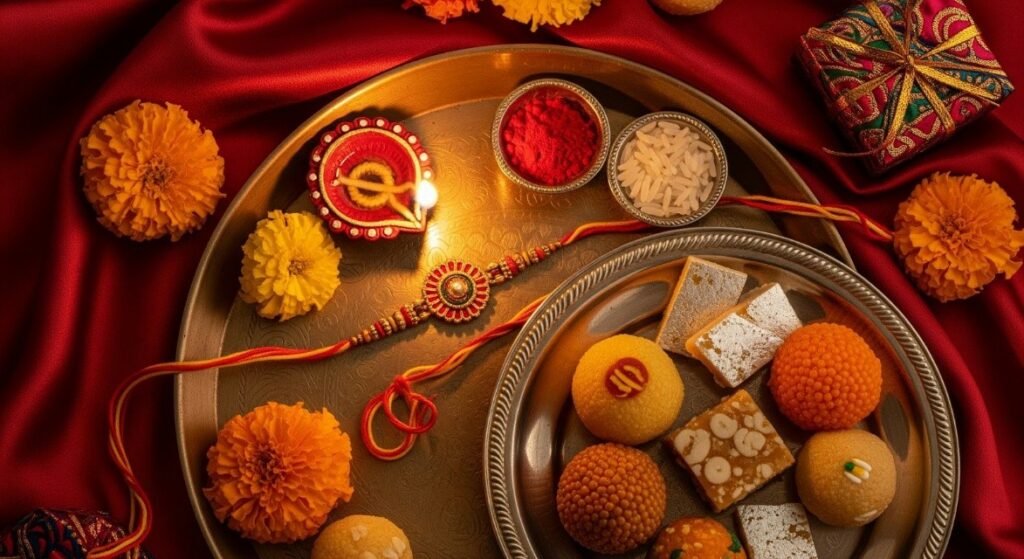Raksha Bandhan has always been one of my favourite festivals, it’s not just a tradition, it’s a feeling. For me, it beautifully captures the essence of the bond I share with my sibling. It’s about love, trust, and a promise of lifelong connection.
Yes, we all look forward to the rituals, the sweets, and that nostalgic Rakhi thali, but at its heart, this festival is about love, sacrifice, and heartfelt homage. In this blog, I want to take you through what Raksha Bandhan means to me, its deeper significance, its history, and how it continues to evolve in our lives today.
What is Raksha Bandhan?
If you’re wondering what Raksha Bandhan really means, let me share what I’ve learned over the years. The name itself comes from Sanskrit “Raksha” meaning protection, and “Bandhan” meaning bond. Together, it translates to “a bond of protection,” which I feel sums up the festival so well. The true Raksha Bandhan meaning goes beyond gifts—it’s about the deep emotional bond between siblings and the promise of protection and love.
Every year, I tie a Rakhi on my brother’s wrist—a simple thread, but packed with emotion. In return, he promises to protect me, stand by me, and more than anything, just be there.
And even though our lives may change, that gesture remains timeless. What’s beautiful is that this tradition isn’t confined to just siblings, it’s celebrated across India and beyond. I know friends abroad who still keep this ritual alive, proving that Raksha Bandhan truly transcends borders and backgrounds.
Historical & Mythological Significance
Growing up, I was always fascinated by the stories behind festivals, and Raksha Bandhan is full of them. Here are a few that have stayed with me:
- Krishna and Draupadi (Mahabharata): I remember reading how Draupadi tore a piece of her saree to bandage Krishna’s wound, and in return, he vowed to protect her always. It’s a beautiful reminder that love isn’t always loud—it’s in the little things.
- Yama and Yamuna: According to mythology, Yamuna tied a Rakhi to her brother Yama, the God of Death. Moved by her love, he granted her immortality. The message? That true affection knows no fear, not even death.
- Rani Karnavati and Emperor Humayun: One story that always stood out to me from history class was of Rani Karnavati, who sent a Rakhi to Emperor Humayun seeking protection. He honoured that bond, proving that Raksha Bandhan can go beyond family—it’s about trust.
Even today, I see Rakhis exchanged not just between brothers and sisters but among cousins, friends, and even neighbours. It’s a symbol of mutual respect, and I love how personal and creative people get with their celebrations.
When is Raksha Bandhan Celebrated?
In 2025, it will be observed on 9 August, which is the full moon day of Shravan, also known as Shravan Purnima.
Like many Hindu festivals, the Raksha Bandhan date changes every year as it’s based on the lunar calendar. Celebrations typically begin early in the morning, with auspicious hours (muhurat) guiding the timing of rituals.
Why is Raksha Bandhan Celebrated?
People often ask, why celebrate Rakhi? The festival honours love, care, protection, and mutual responsibility among siblings and loved ones.
It is no longer limited to brothers protecting sisters. Sisters tie Rakhis to sisters, friends exchange them, and even neighbours and soldiers are honoured. It’s a celebration of unity, support, and unconditional love—this evolving spirit is part of why we celebrate Rakhi across generations. With Raksha Bandhan 2025 just around the corner, it’s the perfect time to celebrate the bond of love and protection with meaningful, health-conscious gifts.
Traditional Rituals & Customs

The festival includes a variety of customs and traditions, all of which make it unique. These include:
- Rakhi Tying: Sisters tie rakhis on their brothers’ wrists. They also put a tilak on their foreheads and perform an aarti. Brothers give gifts and promise to protect them.
- Sweets & Festive Foods: No festival in India is celebrated without sweets. Barfi and laddoos are popular favourites. OMKITCHEN’s Om Sweets range offers healthier, organic options for those seeking guilt-free indulgence.
- Gift Exchange: Exchanging gifts is a common part of the celebration. These can include traditional attire, jewellery or even personalised tokens.
Regional Variations
In Maharashtra, fishermen offer coconuts to the sea, combining Raksha Bandhan with Narali Purnima. In South India, the festival includes prayers to family deities and sacred thread ceremonies.
In Nepal, it’s known as Raksha Bandhan or Janai Purnima, focusing on changing a sacred thread (Janai), showcasing the regional diversity of why we celebrate Rakhi.
Modern-Day Celebrations
Due to urbanisation and globalisation, Raksha Bandhan celebrations have transformed over the years. People now prefer eco-friendly gifts, personalised hampers, and organic sweets. With families often living apart, digital celebrations—via video calls and online Rakhi deliveries—have become common.
Eco-conscious and gender-neutral Rakhis made from sustainable materials are now popular, keeping traditions alive while adapting to modern values.
Pop Culture
Raksha Bandhan is frequently shown in films and advertisements, often highlighting family ties and sibling affection. Recently, Rakhis have also been sent to soldiers, healthcare workers, and community helpers as symbols of gratitude—broadening the meaning of Raksha Bandhan beyond family alone.
Conclusion
For me, Raksha Bandhan has never been just about rituals—it’s always been a heartfelt celebration of love, trust, and mutual respect. Whether I’m tying a Rakhi in person or sending it across miles digitally, this festival always brings me closer to the people I care about. It’s a beautiful reminder that no matter where we are, our bonds remain strong and meaningful.
How do you celebrate Raksha Bandhan? I’d love to hear your stories and memories—feel free to share them with me!
FAQs About Raksha Bandhan
Is Raksha Bandhan only for brothers and sisters?
No, it’s celebrated among cousins, friends, and even sisters themselves.
What is the story behind Raksha Bandhan in Mahabharata?
It’s about Krishna and Draupadi. She tied a cloth around his finger, and he vowed to protect her.
Can Rakhi be tied to cousins or friends?
Yes, Rakhi can be tied to cousins, friends, or anyone you share a meaningful bond with.
How is Raksha Bandhan different in North and South India?
In North India, it’s more focused on the Rakhi ritual. In South India, it includes family deity worship and sacred thread ceremonies.
What should I gift my sister/brother on Raksha Bandhan?
Personalised items, organic sweets, books, and sustainable gifts are ideal. Wellness hampers also make thoughtful presents.
Can I send Rakhi online? How do virtual Raksha Bandhan celebrations work?
Yes, you can send Rakhis and gifts online. Virtual celebrations include video calls, digital cards, and heartfelt messages.
Is Raksha Bandhan a public holiday in India?
While not a nationwide public holiday, Raksha Bandhan is observed as a regional holiday in several Indian states.
Also Know About:
Here’s why you should buy mouth-watering organic sweets for Raksha Bandhan
Vrat Ka Khana: Top 7 Traditional Fasting Items for Janmashtami 2024

